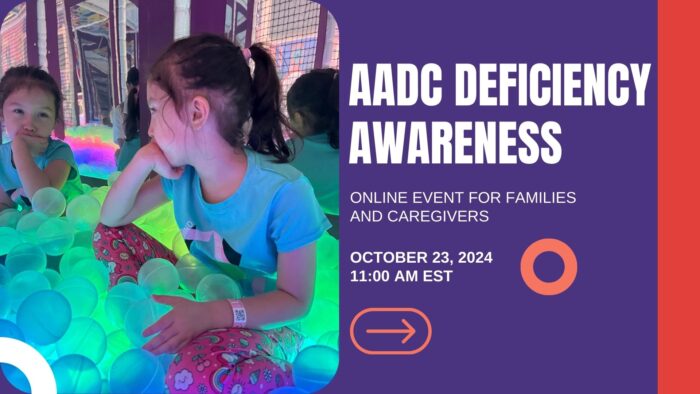Appreciating the power of AADC Deficiency Awareness Day
This observance is all the more important considering the rarity of the disease
Written by |

Aromatic l-amino acid decarboxylase (AADC) deficiency is a rare genetic disorder that disrupts the production of neurotransmitters, including dopamine and serotonin. That leads to severe developmental delays, weak muscle tone, and other complex challenges that are hard to imagine unless you’ve lived through them. For families like ours, with a child who has AADC deficiency, raising awareness is crucial — not only for the sake of our children, but also for advancing research and treatments that can transform lives.
A 2023 article in Pediatric Research estimated AADC deficiency affects about 1 in 1.3 million worldwide and 1 in about 65,000 East Asian people, making it an ultrarare condition. However, the exact number of affected individuals is difficult to determine because of underdiagnosis and misdiagnosis, as its symptoms can resemble other neurological conditions. Thankfully, newborn screening is now helping to end the diagnostic odyssey much earlier.
According to data from organizations like the National Organization for Rare Disorders (NORD) and Rare Diseases Europe (EURORDIS), it takes seven to eight years on average to diagnose a rare disease. That’s because of several factors, including a lack of awareness among healthcare professionals, symptoms mimicking more common diseases, and limited availability of genetic testing.
Because AADC deficiency is so rare, awareness and early diagnosis are critical for helping affected families access available treatments and support.
First AADC deficiency awareness event
I’ll never forget my first AADC Deficiency Awareness Day, in November 2019. It was a pivotal moment for me, not just as a father but as an advocate. I’d spent so much time just being there for my daughter, Rylae-Ann, who’d recently undergone lifesaving gene therapy, that I hadn’t quite found my voice in the community.
But that day was different. Only about 20 people attended, and we didn’t say much to one another at the beginning. But that changed. A dad from Germany was at the event, even though his child had passed away from the debilitating symptoms of AADC deficiency. Despite his unimaginable grief, he and his wife wanted to join the group, not to mourn but to give hope to others.
I was so deeply moved by his courage and speech. Here he was, just months after losing his child, and yet he was able to stand up and share his story, offering strength to those of us still on our journey.
That moment changed me. Until then, I’d been a wallflower, listening from the sidelines at the various events I attended. But at the end of that meeting, I spoke up. I shared our family’s story because his strength touched something inside me.
I realized that we have a responsibility not just to fight for our own children, but also to inspire hope in others. I explained the before and after of Rylae-Ann’s gene therapy, as well as how we overcame the obstacles — and saw firsthand how sharing experiences can build connections and offer comfort to families walking the same difficult path.
As we prepare for another AADC Deficiency Awareness Day on Oct. 23, I want to encourage you to join us, especially if you’re a parent or family member of a child with AADC deficiency. Share your story. Your voice could inspire hope, strength, and solidarity in another family. We’re stronger together, and the more we share, the more we grow as a community.
Through that awareness day and as a member of the Bionews community, I realized stories are a key that can unlock someone else’s prison. Sharing our stories isn’t just about us; it’s about lifting up others and giving them hope when they need it most.
Note: AADC News is strictly a news and information website about the disease. It does not provide medical advice, diagnosis, or treatment. This content is not intended to be a substitute for professional medical advice, diagnosis, or treatment. Always seek the advice of your physician or other qualified health provider with any questions you may have regarding a medical condition. Never disregard professional medical advice or delay in seeking it because of something you have read on this website. The opinions expressed in this column are not those of AADC News or its parent company, Bionews, and are intended to spark discussion about issues pertaining to aromatic l-amino acid decarboxylase deficiency.







Leave a comment
Fill in the required fields to post. Your email address will not be published.